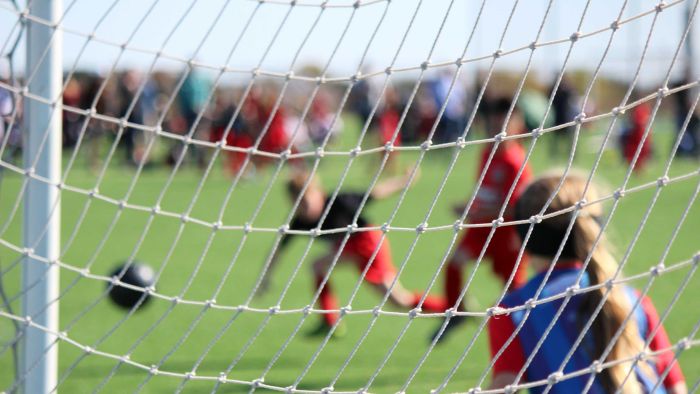You only needed to watch Diego Maradona waddle his way through the opposition, turning even the greatest defenders into human training cones, to appreciate his sublime talent.
On any playground, pitch or back alley on the planet, Maradona’s dancing feet would have set him apart from mere footballing mortals.
Yet the timing of Maradona’s death this week prompted a thought beyond the many touching tributes to his genius and explorations of his very human character — would he have conquered the world if he had been born in Brisbane and not Buenos Aires?
Coincidentally, Maradona’s death coincided with the publication of two media reports that shone a now routinely unflattering light on the way football talent is identified and developed in Australia, and the administrators who oversee that process.
Sydney’s Sun-Herald newspaper ran an extensive story on the cutthroat process whereby children aged between 9 and 13 compete for sought-after places in club-based skills acquisition programs.
Entry to these mini academies costs $1,500 per season, with the Sun-Herald reporting parents at some clubs were told they must pay a $500 deposit on the spot if their child passed a trial — sometimes under the threat they would miss out if they didn’t cough up the cash immediately.
This was just the first step in a “pathway” where graduates of the ultra-competitive skills acquisition programs would then fight for places in the National Premier League clubs at a further cost of $2,650 per season.
Of course, only the added details will be surprising to any parent or player who has endured Australian football’s bottom-to-top financial model in which participants pay for funding shortfalls at local clubs, state associations and even in the national administration.
The relative expense of playing even the earliest levels of football — often three or four times as much as Australian rules, rugby league and cricket — has long been the hottest topic at football forums where fans are invited to air grievances about the game, but are seldom rarely heard.
“Financial wherewithal should never be an indicator of sporting achievement, certainly not in the simple game the very nature of which is more inclusive than other, just a ball and boots,” retired Socceroo Craig Foster told the Sun-Herald.
Equally concerning is that skill acquisition centres are creating survival-of-the-fittest programs for players at an age when young talent — yes, even “elite talent” — is best nurtured in an enjoyable non-judgemental environment.
You need only see the changes adopted by New Zealand rugby, Australian junior cricket and various European football programs to understand how this immersive philosophy is being successfully embraced, despite the lingering ill-informed school-of-hard-knocks myth that competition builds “character” and “resilience” in early-age juniors.
Juniors faced by fees hike
Also, this week the ABC’s 7.30 program ran a report about concerns that former politician Robert Cavallucci had been paid almost $320,000 a year to become Football Queensland (FQ) chief — double the wage of the previous CEO — after a recruiting process led by fellow FQ board member Ben Richardson at a cost to football of $44,000.
These claims were first reported by former FFA corporate affairs director Bonita Mersiades and are the subject of a defamation suit filed by Cavalluci and Richardson who are claiming $800,000 in damages against Mersiades.
While the FQ executives deny any wrongdoing, a subsequent hike in registration fees for Queensland participants — an extra $2.50 for juniors and $5.50 — almost precisely covered the new chief executive’s salary and his recruiting costs.




So regardless of whether FQ can justify the added expense by creating new funding initiatives, again it is the players at the bottom of the sport’s competitive pyramid who are asked to stump up the cash to get the ball rolling.
You could blame Australian football’s failure to gain substantial media rights money and corporate backing for the A-League and national teams, the cash and government goodwill squandered during the disastrous 2018 and 2022 men’s World Cup bid, or the continued inability to use a vast participant base as anything but a convenient cash cow.
Whatever the cause, Australian football continues to disenfranchise and disenchant its greatest asset — its legion of male and female players — by making even the youngest would-be star literally pay the price for continued administrative failings.
Which makes you wonder if there has been an Aussie Diego whose parents couldn’t fork out the $1,500 for an academy place; or who didn’t bring their wallet to the trial and put $500 in the hands of a club boss desperate to buy a striker for his senior team.
Would Aussie Diego’s talent have thrived in a system that risks taking the innocent joy from kids who should be honing their skills in a supportive environment, not learning to suppress their instincts for fear of officious technical judgement?
Has the money that should have been allocated to Aussie Diego’s development instead been lavished on local and even national administrators “earning” the kind of salary the game can only afford by taxing its participants?
The answer, of course, is that a talent as colossal as Maradona’s would surely shine through.
But the subsequent question the newly branded Football Australia must ask itself is whether an Aussie Diego would conquer the world because of his experiences here, or despite them.
Host Kelli Underwood and the Offsiders panel will discuss all the latest sports news and issues on Sunday at 10:00am on ABC TV.







